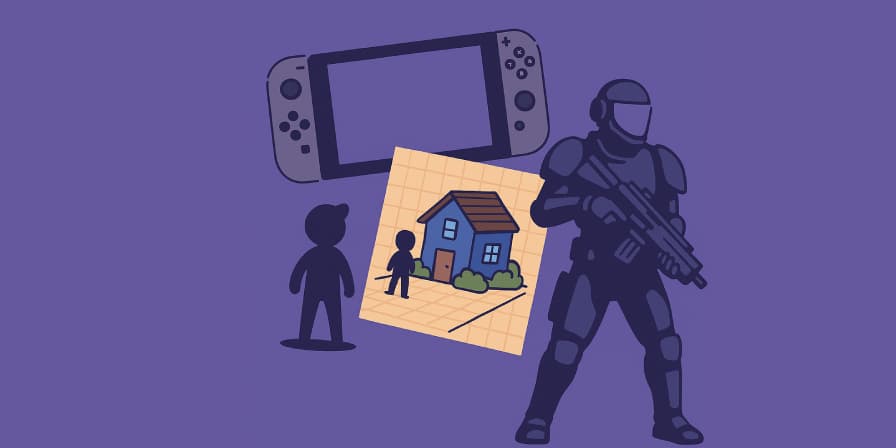Beyond the Hype: Nintendo Switch 2, Blueprints, and Marathon

Nintendo Switch 2: Evolution or Mere Iteration?
Nintendo's upcoming Switch 2, set to launch on June 5, 2025, has been the subject of much anticipation. Priced at $449.99, with a $499.99 bundle including Mario Kart World, the console boasts a 7.9-inch 1080p HDR screen, 256GB of expandable storage, and capabilities for up to 120fps gameplay with 4K TV dock support.
Hands-on impressions from events in Los Angeles and Tokyo suggest that while the console feels sturdier and more refined, it doesn't represent a radical departure from its predecessor. Notably, the new Pro Controller features improved analog sticks and rear paddle buttons, though concerns about potential stick drift persist, as Nintendo has not confirmed the inclusion of Hall effect sensors.
The introduction of "mouse mode" via Joy-Con rotation offers a novel control scheme, particularly highlighted in Metroid Prime 4: Beyond. However, its practicality across various game genres remains to be seen. The Donkey Kong Bonanza demo showcased an open-level design reminiscent of Super Mario Odyssey, emphasizing exploration and environmental interaction.
Despite these enhancements, the Switch 2's hardware is reportedly on par with the PlayStation 4, raising questions about its longevity and competitiveness in a market moving towards more powerful systems.
Tariffs and the Gaming Economy: A Pricey Affair
The gaming industry is grappling with the implications of recent U.S. tariffs on Chinese-made goods, which have led to significant price increases. Microsoft, for instance, has raised the price of the Xbox Series X from $500 to $600, attributing the hike to the 145% tariffs imposed by the Trump administration.
Nintendo has managed to maintain the Switch 2's base price, possibly due to diversified manufacturing strategies, including production in Vietnam. However, the company has increased prices on accessories, and there is speculation about potential future price adjustments if tariff pressures persist.
Analysts warn that these economic factors could influence consumer spending, with some suggesting a shift towards free-to-play models as gamers become more cost-conscious.
Blueprints: An Indie Gem with Depth
Blueprints, developed by Dogey Bomb, is a first-person roguelike puzzle game that challenges players to navigate a constantly changing mansion while solving intricate puzzles and uncovering family secrets. Drawing comparisons to titles like The Witness and Gone Home, the game emphasizes exploration and narrative depth.
Players inherit a mansion that reconfigures daily, requiring strategic planning and note-taking to progress. The game's unique blend of resource management and storytelling offers a fresh experience, though its complexity may not appeal to all.
While Blueprints may not achieve mainstream success, it stands out as a thoughtful and innovative title in the indie gaming scene.
Marathon: Bungie's Return to PvP Roots
Bungie's upcoming title, Marathon, marks the studio's return to the Marathon series and a focus on player-versus-player (PvP) gameplay. Set on the planet Tau Ceti IV, players assume the roles of "Runners," cybernetic mercenaries competing to extract valuable artifacts in a hostile environment.
The game features team-based extraction shooter mechanics, with matches involving up to six three-player teams. While Marathon introduces hero-based gameplay and ranked competitive modes, some critics argue that it resembles Destiny 2's Crucible mode with a new aesthetic.
Priced as a premium title, Marathon is set to release on September 23, 2025, across PlayStation 5, Xbox Series X/S, and PC, with full cross-play and cross-save support. Its success will likely depend on Bungie's ability to differentiate it from existing titles and deliver a compelling PvP experience.
Conclusion: Navigating the 2025 Gaming Landscape
The gaming industry in 2025 is marked by both innovation and economic challenges. While the Nintendo Switch 2 offers refinements over its predecessor, questions about its hardware capabilities and pricing strategy remain. Indie titles like Blueprints showcase the creative potential of smaller studios, providing unique experiences for players seeking depth and narrative complexity. Meanwhile, established developers like Bungie are exploring new directions with titles like Marathon, aiming to capture the competitive multiplayer market.
As tariffs and economic uncertainties continue to influence the industry, both developers and consumers must adapt to a shifting landscape, balancing innovation with affordability.
Comments
0 comments posted